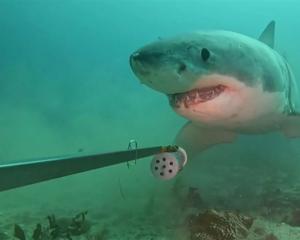
The organism is already in other lakes around New Zealand, including Rotoiti and Rotoroa in Nelson Lakes National Park, and there are fears it could spread to the tiny Blue Lake, too, which is popular with trampers.
The spring-fed Blue Lake's clarity is consistently between 70-80 metres, which reaches the theoretical clarity of distilled water. Diving is typically thought to have outstanding clarity at 40m, which is rare around the New Zealand coast. The next clearest lake is Oregon's Crater Lake, at 30-40m visibility.
This summer the Department of Conservation (DOC) hired a paid hut warden, Kylie Batt, whose job it is to warn people about lake snow.
"[The lake is] extremely sacred to our local iwi of Ngāti Apa ki te Rā Tō. Although [the signs] say no swimming, that's not the case - it's no touching. We really don't want that cross-contamination to happen in any way, shape or form.
"I find most people [are respectful] but you're always going to get some people who aren't, especially if they're not culturally sensitive because sometimes they believe that's why they can't get in the water. But it's not just that - although that's really important - it's really a biosecurity hazard now."
Lake snow is a nuisance because it sticks to fishing gear, boats, motors, and people. If it gets into the residential water supply, it causes blockages and clogs filters as well as household appliances connected to the system.
On the lake, anglers may find the algae accumulates on fishing lines and lures. It can also stick to boat hulls and equipment, wetsuits and your skin or hair if you encounter it. It is easily spread between lakes on or in contaminated watercraft, trailers, clothing, boots, animals, tramping equipment and fishing gear.
Tasman District Council communications officer Tim O'Connell said it only took one droplet of water or tiny piece of slime infected with Lindavia intermedia to spread.
"Tasman district's alpine lakes - including Rotomairewhenua/Blue Lake and Rotomaninitua/Lake Angelus - have some of the cleanest and clearest water in New Zealand and we want to keep them that way," he said.
The council was working alongside the Department of Conservation, Ministry for Primary Industries and Fish & Game to combat its spread, he said.
"We carried out water sampling in association with DOC last summer that confirmed the invasive microscopic algae Lindavia intermedia is present in both Lakes Rotoiti and Rotoroa in Nelson Lakes National Park. Further testing in 2021 found Lindavia in Lake Rotoiti was increasing."
Lake snow is not toxic to humans or animals, but the impact of the algae on the lake's ecology and health is not fully understood.

Retired NIWA water scientist Rob Merrilees, who first visited the lake 20 years ago and did the first measurements of its clarity with a NIWA team, said he hoped New Zealanders could appreciate the lake without spreading the diatom.
"It's a beautiful place and it should be appreciated for what it is - and it shouldn't be trashed."













